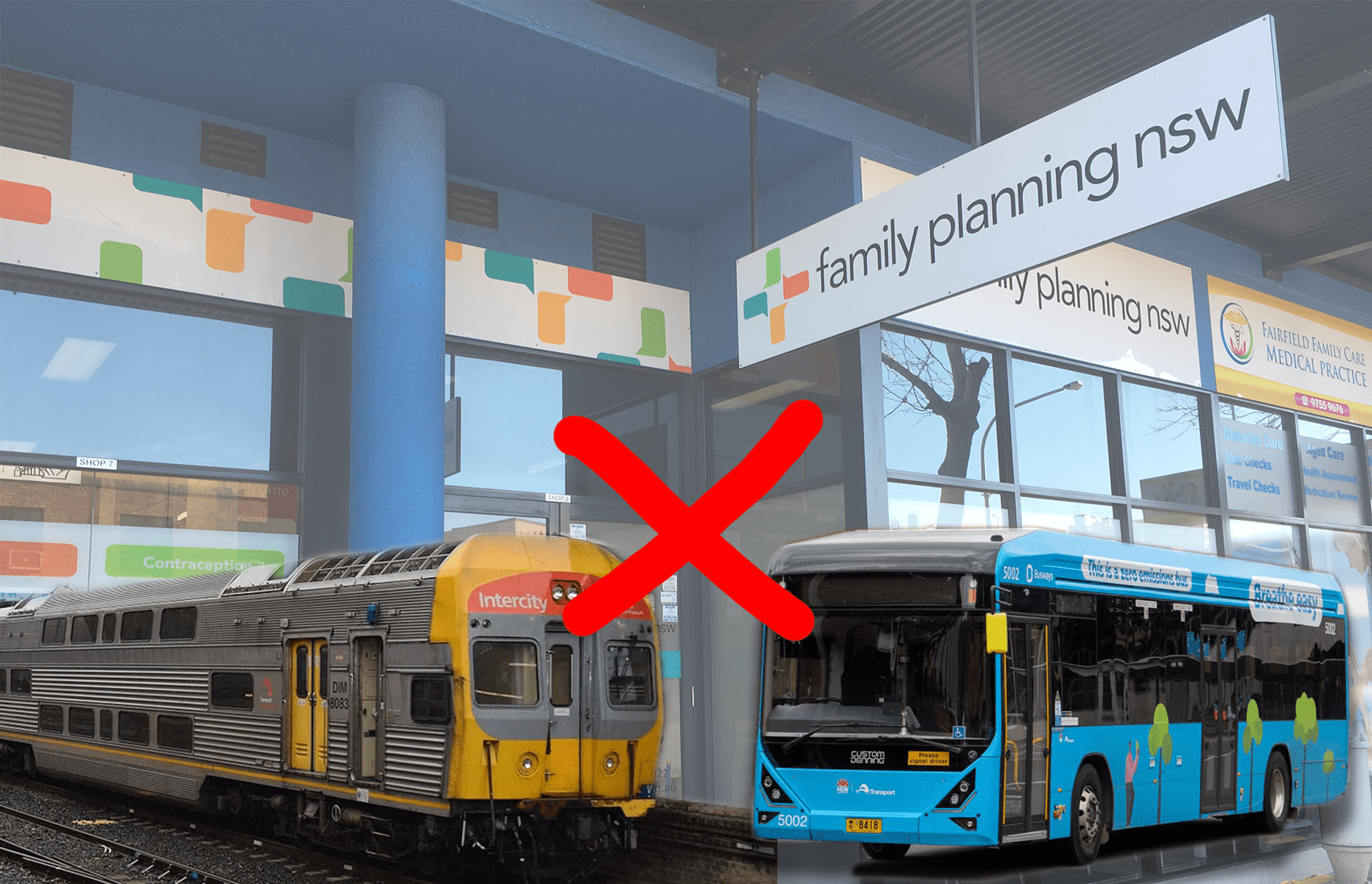Family planning NSW (FPNSW) is a healthcare service that provides low cost and bulk billed reproductive and sexual health services. Out of the five locations, two are regional: Newcastle and Dubbo. The latter has travelling outreach clinics in Nyngan and Cobar. Three are in Sydney; Penrith, Fairfield, and the Newington clinic — which until this year was previously located in Ashfield.
The suburb of Newington (not to be confused with the private boys school) is located between Sydney Olympic Park and the Silverwater Correctional Complex in Silverwater. The official opening of the relocated Newington clinic was announced on 5 January this year to the FPNSW emailing list, which spruiked a day clinic and more space for more services than the previous location.
I was drawn in by the email’s inviting phases – “Our new facility now features state-of-the art clinics, including a day procedure unit, allowing us to expand the types of services available to you”. It is important that people have a range of choices and services to select from, and it appeared positive that the organisation decided to move in this direction.
“Our new site is easy to reach, with ample parking and public transport routes available,” the email suggested. A helpful map showed bus routes from three different train lines, depicting what appeared to be a highly accessible location for the greater city region.
When I attempted to travel to this location using public transport from my home in the City of Canterbury Bankstown, it took me two hours to travel 12 km. When combined with the punctuality of health care appointments, the duration of the appointment, and travel back, this adds up to over 5 hours. It suffices to say that this is not an accessible amount of time for many people with day jobs, carer responsibilities, or general life appointments to attend to.
The map in Figure 1 shows three public transport options:
Option 1 shows the 544 bus from Auburn Station is 17 minutes door to door. This comes once an hour between 10pm and 4pm. More frequent services begin at 4pm, allowing patients to arrive to knock on the closed clinic doors.
Google maps suggests an alternative from Auburn station catching the train to Parramatta and taking the 525 bus (41 minutes), or walking for 49 minutes as appropriate and more frequent services.
Option 2 is the 526 bus route from Rhodes Station. This service comes twice an hour from 9 am to 5 pm. Again, Google Maps suggests taking a train to an alternate station (Strathfield) to take a more frequent bus service
Option 3 suggests taking the 525 or the 526 bus route towards Parramatta or Rhodes respectively, and departs 4 times per hour from Olympic Park Station. However, trains must be changed at Lidcombe as there are no direct trains from the city or Parramatta to SOP.
An unadvertised option is On Demand public transport option Bridj that services areas from Burwood to Silverwater. Bridj is a demand-responsive bus service booked by users on smart phones using an app and card payment details. A number of minibuses operate in a certain area picking up and dropping off travellers, much like a rideshare service. However, this serviced area is split into two zones. The east zone ends at Sydney Olympic Park, but includes many train stations on the T2 and T9 train lines. The west zone includes Lidcombe Station and Family Planning NSW itself. Despite costing as little as $2.65 a trip without a concession card, individuals would have to take two asynchronous services from most nearby serviced train stations.
I asked a sample of 18-24 year olds about their experiences with reproductive health services. Many had not used Family Planning NSW; instead, they had used whatever service was closest. Answers given included GPs or clinics within 10-15 minutes travel of their home. One responder noted that it was a 10 minute drive from their home, but almost an hour on the bus to reach the service.
Another issue with accessing FPNSW was appointment availability. Patients can wait months for a consultation, resulting in them booking and paying for services closer to home — which may not provide the same level of care or treatments as FPNSW .
For patients that do manage to get a booking at FPNSW, and are willing to endure extensive travel times, they face infrequent public transport services that have resulted in missing sought-after appointments.
Even within the two cities in the state that have FPNSW clinics, access to those clinics is considerably limited due to their location. More than 30% of NSW’s population live outside one of these two fortunate cities and have considerably less access to FPNSW clinics than people in places like Canterbury Bankstown. With such limited services, people in regional areas must pay for services that they may not be able to afford, travel excessive distances, or settle for services that do not meet their needs.
It is my dream that there will be bulk billed sexual health clinics on every street corner with walk-in appointments. Until then, I’ll see if my mum will drive me.





